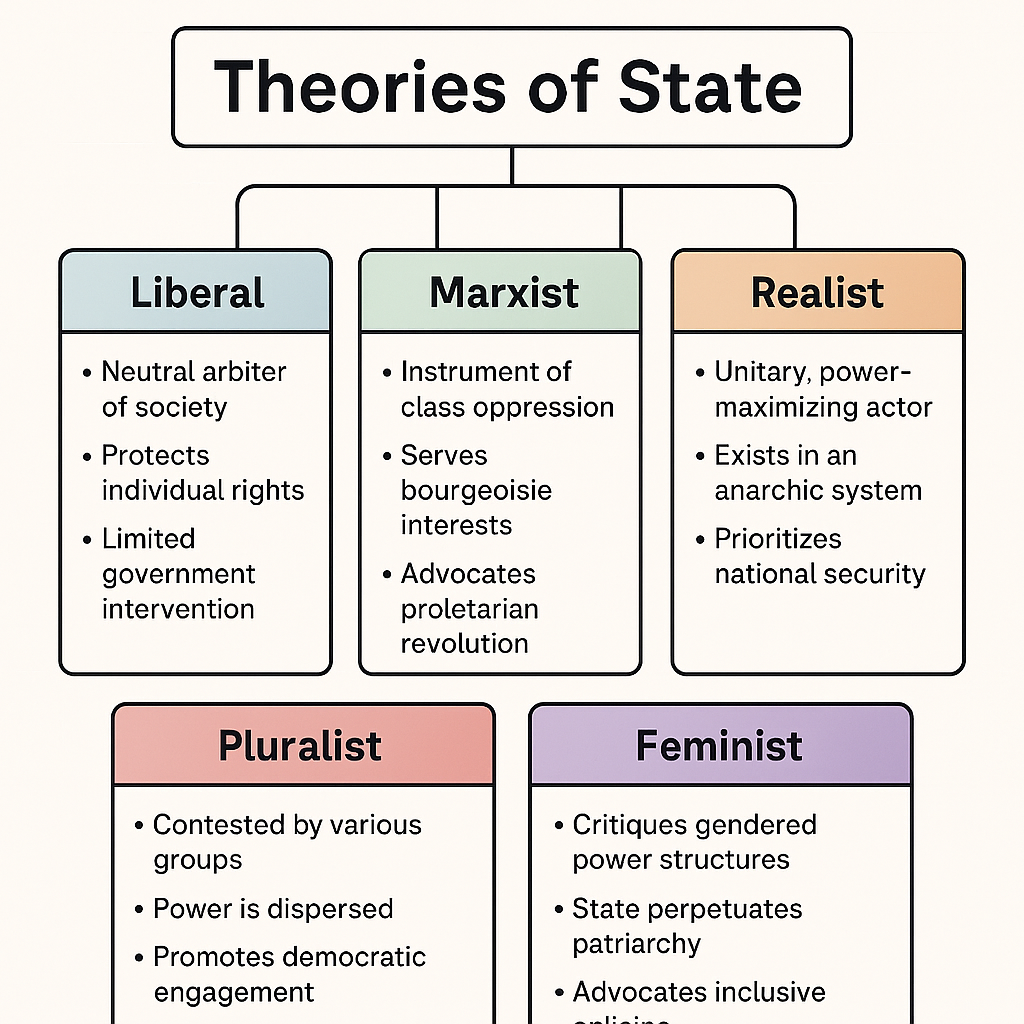
20 Jul Theories of State in International Relations
Theories of State in International Relations – UPSC PSIR Optional
What is the State?
The state is a political organization with centralized authority, defined territory, permanent population, and sovereign power. It is the primary actor in International Relations and forms the core unit of analysis in both domestic and global political systems.
Max Weber famously defined the state as “a human community that (successfully) claims the monopoly of the legitimate use of physical force within a given territory.”
There are several theories that attempt to explain the nature, role, and purpose of the state. Each theory offers a different lens to understand governance, power dynamics, and state-society relationships.
1. Liberal Theory of State
Key Proponents: John Locke, Adam Smith, J.S. Mill, Bentham
The liberal theory views the state as a neutral body that exists to protect individual liberties and private property. It operates on the principle of a social contract and emphasizes limited government intervention, rule of law, and individual rights.
Key Features:
- The state is a necessary evil created by consent.
- Purpose: Protection of life, liberty, and property.
- Supports capitalism and free markets.
- State should act as an umpire, not as a player.
Relevance in IR:
- Justifies international institutions and cooperation (e.g., UN, WTO).
- Supports liberal internationalism and promotion of democracy.
- Explains the rise of liberal democratic states and international law.
2. Marxist Theory of State
Key Proponents: Karl Marx, Friedrich Engels, Lenin, Gramsci
Marxist theory sees the state as an instrument of class oppression. It functions to protect the interests of the bourgeoisie (capitalist class) and perpetuate economic inequality.
Key Features:
- The state is not neutral – it reflects the dominance of one class.
- It is a tool for maintaining capitalist production and private property.
- Revolution and proletarian control are essential for true equality.
Relevance in IR:
- Explains imperialism, neo-colonialism, and exploitation in global systems.
- Critical of capitalist world order (e.g., IMF, World Bank structures).
- Useful to understand global inequality and class-based analysis of states.
3. Realist Theory of State
Key Proponents: Thomas Hobbes (indirect), Hans Morgenthau, Kenneth Waltz
Realism views the state as a sovereign, unitary actor operating in an anarchic international system. The state’s primary objective is to ensure its survival through power maximization.
Key Features:
- State is the primary actor in IR.
- International system is anarchic – no global government.
- State acts in self-interest; morality is secondary.
- Power (especially military) is the currency of international politics.
Relevance in IR:
- Explains Cold War, balance of power, and security dilemmas.
- Applicable to India’s strategic choices and defense policy.
- Foundational to realism, structural realism (Neo-realism), and offensive realism.
4. Pluralist Theory of State
Key Proponents: Robert Dahl, Truman, Almond
This theory holds that the state is not monolithic but is influenced by multiple interest groups, NGOs, media, and public opinion. Power is diffused among various actors.
Key Features:
- State is an arena of competing interests.
- Democracy is maintained through checks and balances.
- Emphasis on civil society and participatory politics.
Relevance in IR:
- Useful in understanding the role of non-state actors (NGOs, MNCs).
- Explains foreign policy in democratic nations.
- Highlights complexity in decision-making processes.
5. Feminist Theory of State
Key Thinkers: Cynthia Enloe, J. Ann Tickner
The feminist approach critiques the male-dominated nature of the state and its institutions. It questions the gender neutrality of state policies and power structures.
Key Features:
- The state perpetuates gender-based inequality.
- Women’s roles in IR and security are often marginalized.
- Advocates for inclusive governance and intersectionality.
Relevance in IR:
- Brings focus on human security, gendered violence, and peace-building.
- Explains gender disparities in diplomacy and defense sectors.
- Enriches policy debates and global development agendas.
Comparative Table: Theories of State
| Theory | Role of State | Major Thinkers | IR Relevance |
|---|---|---|---|
| Liberal | Neutral arbiter; protector of rights | Locke, Mill | Supports democracy, free trade, institutions |
| Marxist | Instrument of class rule | Marx, Lenin | Explains imperialism, global inequality |
| Realist | Sovereign, unitary power-maximizing actor | Morgenthau, Waltz | Explains anarchy, wars, strategic behavior |
| Pluralist | Contested arena of interests | Dahl, Almond | Democratic engagement, policy complexity |
| Feminist | Gendered structure of power | Tickner, Enloe | Focus on gender in diplomacy and conflict |
UPSC PSIR PYQs Related to Theories of State
- 2022: Critically evaluate the Marxist theory of the state.
- 2020: Compare and contrast liberal and realist views of the state in IR.
- 2019: Examine the relevance of pluralist theory in contemporary Indian politics.
- 2018: Discuss how feminist theories challenge conventional understandings of state and security.
Probable Questions for UPSC PSIR Mains 2025
- Discuss the evolution of the concept of state from liberal to feminist perspectives.
- How do different theories of state explain the behavior of states in global crises like pandemics or war?
- Evaluate the role of the state in a globalized and interconnected world.
- Is the state still the most important actor in international relations? Discuss.
Conclusion
Theories of the state help UPSC aspirants develop a multidimensional understanding of governance, sovereignty, and international relations. For those with PSIR as an optional, mastering these theories not only aids in writing analytical answers but also connects core political concepts with contemporary geopolitical realities. From liberal institutions to Marxist critiques and feminist reimaginings, each theory offers a vital toolkit for navigating the complexities of modern governance and diplomacy.
Keywords: Theories of State in IR UPSC, Liberal State, Marxist State, Realist State, Feminist Theory, PSIR optional UPSC, Political Science UPSC CSE




No Comments